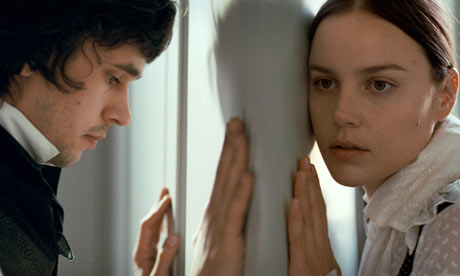John Keats
Today, John Keats is regarded as one of the greatest poets in the English Language but in his time the critics treated him with contempt and mocked his work as vulgar and un-refined.
Throughout his lifetime, Keats faced financial problems and was surrounded by death and illness – his mother, brother and uncle died of tuberculosis and he fell ill with it himself in 1820n aged twenty-four. He travelled to Italy hoping to find a cure but died there just a few months later and was buried in Rome.
The love of his life was a neighbour, Fanny Brawne, to whom he was engaged. Although none of Fanny’s letters to Keats survive today, other facts show that she mourned Keats’ death throughout most of the 1920’s and befriended his sister at his request.His letters to Fanny are as graceful, lyrical and beautiful as his poems
“My sweet Girl—Your Letter gave me more delight than anything in the world but yourself could do; indeed I am almost astonished that any absent one should have that luxurious power over my senses which I feel.
Even when I am not thinking of you I receive your influence and a tenderer nature stealing upon me. All my thoughts, my unhappiest days and nights have I find not at all cured me of my love of Beauty, but made it so intense that I am miserable that you are not with me: or rather breathe in that dull sort of patience that cannot be called Life.
I never knew before, what such a love as you have made me feel, was; I did not believe in it; my Fancy was afraid of it, lest it should burn me up. But if you will fully love me, though there may be some fire, 'twill not be more than we can bear when moistened and bedewed with Pleasures.
You mention 'horrid people' and ask me whether it depend upon them whether I see you again. Do understand me, my love, in this. I have so much of you in my heart that I must turn Mentor when I see a chance of harm befalling you. I would never see anything but Pleasure in your eyes, love on your lips, and Happiness in your steps. I would wish to see you among those amusements suitable to your inclinations and spirits; so that our loves might be a delight in the midst of Pleasures agreeable enough, rather than a resource from vexations and cares. But I doubt much, in case of the worst, whether I shall be philosopher enough to follow my own Lessons: if I saw my resolution give you a pain I could not.
Why may I not speak of your Beauty, since without that I could never have loved you? I cannot conceive any beginning of such love as I have for you but Beauty. There may be a sort of love for which, without the least sneer at it, I have the highest respect and can admire it in others: but it has not the richness, the bloom, the full form, the enchantment of love after my own heart. So let me speak of your Beauty, though to my own endangering; if you could be so cruel to me as to try elsewhere its Power.
You say you are afraid I shall think you do not love me—in saying this you make me ache the more to be near you. I am at the diligent use of my faculties here, I do not pass a day without sprawling some blank verse or tagging some rhymes; and here I must confess, that, (since I am on that subject,) I love you the more in that I believe you have liked me for my own sake and for nothing else. I have met with women whom I really think would like to be married to a Poem and to be given away by a Novel. I have seen your Comet, and only wish it was a sign that poor Rice would get well whose illness makes him rather a melancholy companion: and the more so as so to conquer his feelings and hide them from me, with a forced Pun.
I kissed your writing over in the hope you had indulged me by leaving a trace of honey. What was your dream? Tell it me and I will tell you the interpretation thereof.
Ever yours, my love!
Do not accuse me of delay—we have not here any opportunity of sending letters every day. Write speedily.
The 2009 film Bright Star is a moving and poignant account of the romance that blossomed between Keats and Brawne, it’s highly emotive and perhaps slightly over sentimental in places but well worth a watch if you are a fan of Keats and his poetry.

No comments:
Post a Comment